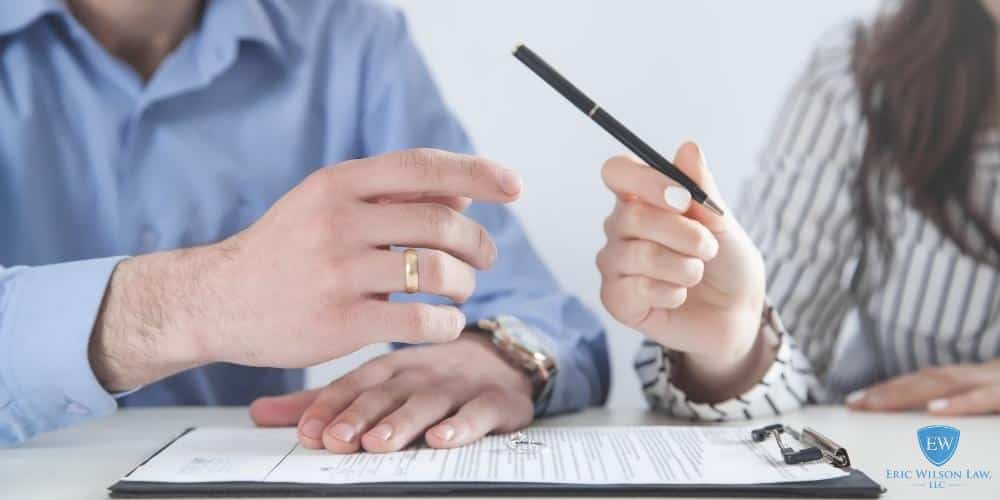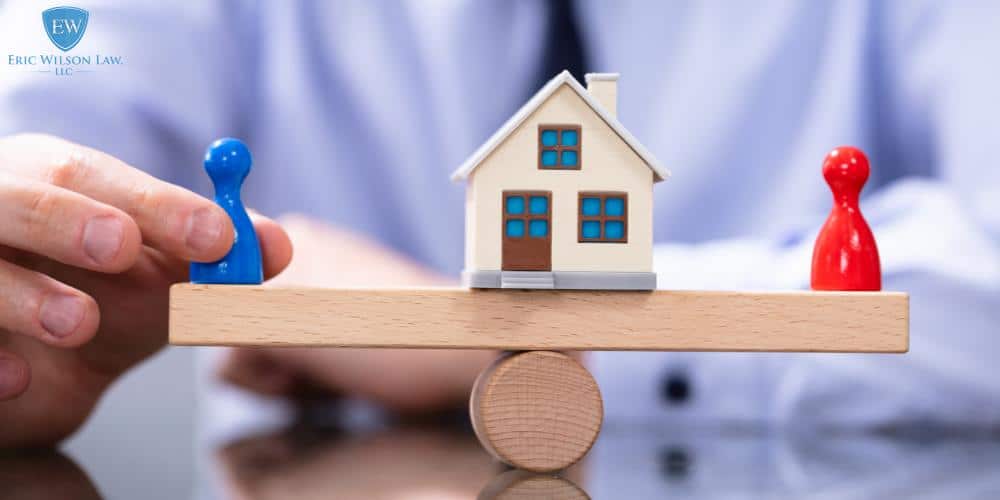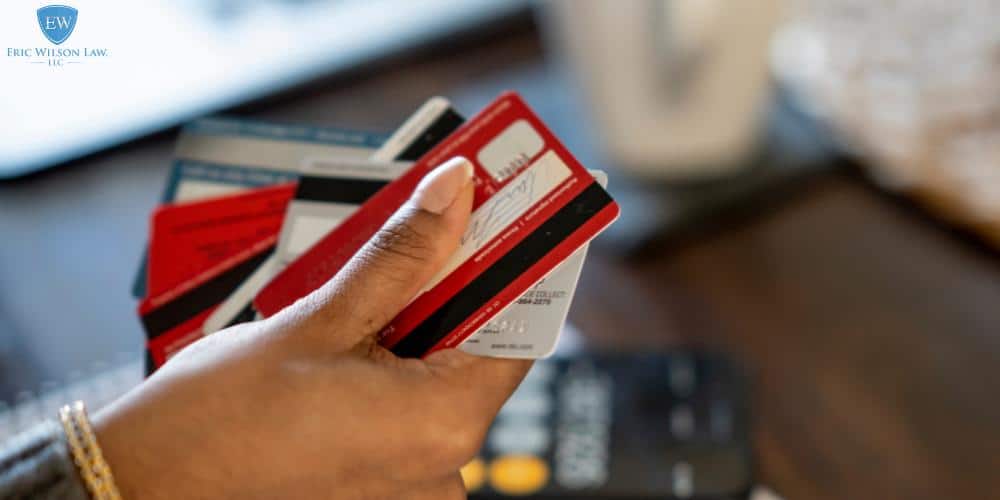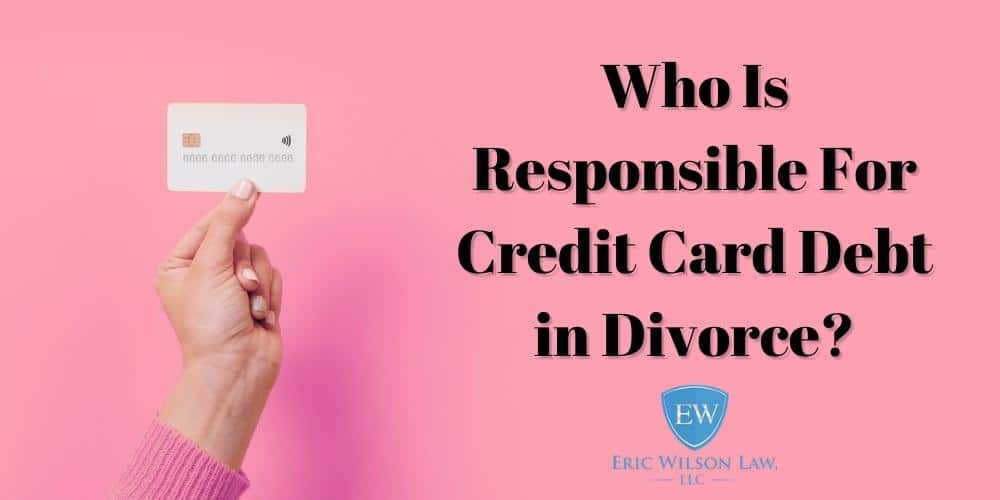Divorce proceedings will likely have you questioning many different things. Many couples are under the impression that debt incurred by one person is that person’s responsibility to pay off. Unfortunately, marriage (and divorce) changes this. Debt can complicate an already complicated situation. If you are considering divorce in Alabama, you may be wondering who is responsible for credit card debt? In divorce proceedings, this debt can either be split equally between each party or divided equitably. Taking on sudden debt can mean years of paying off a debt you may not have even known about.
At Eric Wilson Law, we can help you navigate the rocky terrain of debt after divorce. Our Tuscaloosa bankruptcy lawyers can help you protect your assets and eliminate debt after divorce with bankruptcy. Call 205-349-1280 to schedule a free consultation today.

Types of Marital Debt
Alabama is not one of the many community property states that allow assets and debts to be split equally. Instead, marital debts are divided equitably between each person. Below, we’ll explain the most common types of marital debt and how they are divided in Alabama.
Credit Card Debt
Credit card debt is the most common type of debt in the United States. For many couples, it’s convenient to have a joint credit card account for everyday expenses. Unfortunately, joint credit cards mean that you’re both responsible for the debt after divorce.
Auto Loans
Auto loan debt division depends on when the loan was taken out. If you and your ex-spouse each brought a vehicle into the relationship, you will each be responsible for any loan or debt associated with it. If you financed a car together during the relationship, you may both be responsible for maintaining payments.
Mortgage Debt
Mortgage debt and real estate are tricky things when it comes to divorce. In most cases, the party that keeps the property is the one responsible for the debt.

Medical Debt
Medical debt is typically divided equitably in divorce, since it’s considered joint debt.
Student Loans
Student loan debt division depends on when the loan was taken out. If one spouse comes into the marriage with $30,000 in student loans, they will be the one responsible for paying it back. If one or both spouses took out student loans during the marriage, both parties will likely be responsible.
Personal Loans
Personal loans are considered the responsibility of both spouses. Many times, personal loans are used to finance things for the benefit of the marriage.
Who Pays Credit Card Debt in a Divorce?
Alabama is not a community property state, which means that assets (and debts) are not split 50/50. Instead, debt and assets are divided equitably between the couple. In some scenarios, the split ends up being 50/50 (or close to it). Factors that affect how the debt is split include:
- Which person incurred the debt
- Earning ability of each person
- Income and assets of each person
- Circumstances of the divorce
- Each person’s tax burden
Another factor the court may consider is the nature of the debt. If your ex-spouse came into the marriage with credit card debt, they will likely be the ones responsible for paying it back. If the debt was incurred by one party during the marriage, it’s likely that both parties will be responsible for paying the debt.
Can a Divorce Change My Credit Score?
Your marital status does not appear on any credit reports, so changing it would not change your score. However, other aspects of divorce can cause your score to change drastically. Many factors go into calculating a credit score, which means that your credit score could change over the course of your divorce proceedings. If your spouse took out a credit card in their name and maxed it out, you may be left with half the bill after divorce. This would cause your revolving credit utilization to spike, lowering your score tremendously.
Joint accounts also stay listed on your credit report, even if the courts don’t order joint responsibility. If the divorce decree states that your spouse is the sole responsible party for a joint account, the creditor will still come after you for failing to pay it.
What If My Spouse Racks Up Debt During Separation?
It’s important to remember that credit card companies don’t honor a divorce agreement. If your ex or soon-to-be-ex-spouse racks up credit card debt just before divorce, the judge may order that they pay the bill. Your credit card company likely won’t care that you just went through an emotionally tense experience. They may agree to push back the due date by a few days, but they don’t care where the money comes from. Closing any joint accounts is important to prevent incurring more debt before the divorce is finalized. Make sure your ex-spouse is no longer an authorized user on any accounts solely in your name. This can help prevent a legal headache later on.
Options for Handling Joint Credit Card Debt After Divorce
Paying off debt can take years of scrimping and saving. Paying a debt that isn’t yours can make this process even more bitter and stressful. If you were left holding the bill after divorce proceedings, you have options available. Many debts listed in a divorce decree can’t be discharged with Chapter 7 bankruptcy, but Chapter 13 can help.
Chapter 13 bankruptcy allows you to pay off a large amount of debt in a short time frame (3-5 years). Any debt remaining after the payoff time is over is wiped away. Chapter 13 bankruptcy can prevent you from spending decades of your life paying off a never-ending stream of debt. At Eric Wilson Law, we can guide you through this process and see you through to the other side. We can also give you the tools you need to live debt-free after divorce.

Eric Wilson Can Help You Protect Your Assets
At Eric Wilson Law, our Tuscaloosa bankruptcy attorneys want to help. We know that divorce and bankruptcy are closely related. Filing for bankruptcy shortly after divorce can be a stressful and overwhelming experience. We can help make this process as smooth as possible for you. Eric Wilson is an efficient Alabama bankruptcy attorney with more than 25 years of experience helping individuals navigate bankruptcy. Let us use our decades of experience to help you. We can provide personalized strategies that work best for your unique situation. Call us today at 205-349-1280 to schedule a free consultation.


